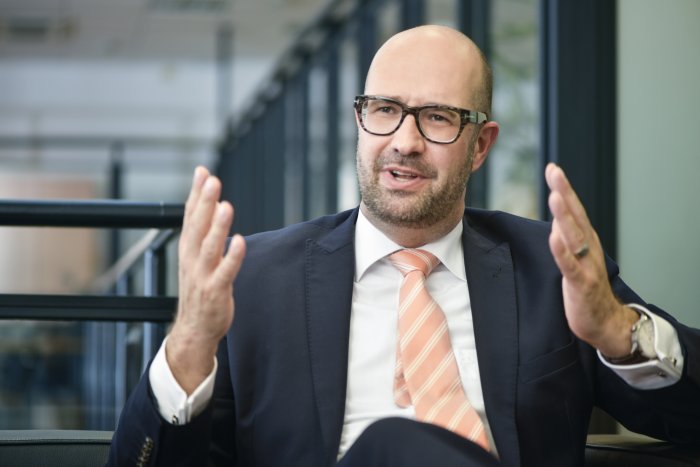Building a ‘Feedback Culture’, Changing for a Digitalized Future

There is little wonder that a business celebrating 25 years in Hungary should look back on its history, but Commerzbank Zrt. President-CEO Klaus Windheuser is just as keen to look to the future.
“We are convinced that digitization will change our industry, and it is already beginning to do so. Nobody can say for sure what banking will look like in the future, but we are observing the trends” Windheuser tells the Budapest Business Journal in an exclusive interview in his Danube-view office.
“We, at Commerzbank, are trying to find disruption, introducing fintech, adopting new technology, but if something doesn’t work, we stop it and start with a new idea. We are getting leaner, more agile. This is a big change for traditional banks whose model has stayed the same for decades. They need to understand how the speed has been picking up over the past few years.”
Windheuser has his own vision for what banks will become. “I think we will become technical enterprises in our backbone with advisory people at the front end if desired. Our purpose is to make life easier and more convenient for our clients. This is where we are headed.” One possible future is that banks no longer develop everything themselves but specialize in certain areas and in others become “trusted organizations, being engaged and able to advise on a range of financial instruments, to advise our clients on what the best solutions are for them.”
It is a game for leaders, because it is all too easy to fall behind the tremendously increased speed of development. “That is where we are trying to be: a couple of paces ahead of the curve.”
Human-centered
But for all Windheuser says the future will be built on fintech and digitization, he insists it will remain human-centered. “In complex situations, where it comes to risk assessments or to large investments, people want to see people. That will not change anytime soon.”
It is easy to forget how far we have come, and how fast. “When I started in banking in 1990, the world was totally different,” Windheuser recalls. “There were two people for one phone. IT devices were just coming in, we shared terminals, not PCs, there was no email, everything was analogue. Banking today is non-stop, 24/7, or at least offers that possibility.”
Hungary, too, has changed in the years Commerzbank has been here. “We opened a representative office here in 1991, and in 1993 opened as a branch offering our full range of products.” Initially the market was good, developing rapidly, but there were also “tough decades”, not least the international recession that followed the sub-prime mortgage crisis that blew up in the United States in late 2007.
Everyone felt the downturn in the economy, and all the players in Hungary were hit by the government’s bank levy. That was introduced in September 2010 at a rate of 0.5%, then in 2011 set at a rate of 0.53 % for balance sheet totals of more than HUF 50 billion. Although it was reduced in 2017 to 0.21%, the tax is still in existence.
But even with the tax in place, business looks promising, the CEO says. “There is good business ahead. The economy is doing well and while it is true we are a mirror of the economy, we are also working to grow through our own activities; we will increase our market share.”
He says that Commerzbank has targetted sustainable growth with a double digit CAGR growth. “Our market share positions us as a well-known bank in corporate business and on the other hand leaves nice room for growth!” Part of that growth is being driven by a trend of Hungarian corporates switching from Hungarian banks that lack an international network.
Independent, International, Quick
“We see more and more Hungarian businesses that want independent international banks. Why do corporates do business with us? Well, there are lots of reasons but one is because of our international setup with branches and offices in almost 50 countries and a worldwide network offering international access many Hungarian banks do not have. And people; banking is a people business so we make sure we have best corporate banking team.”
It often seems that everyone in the country is facing problems caused by the growing labor shortage. But Windheuser says Commerzbank is, in fact, little affected, at least in its primary banking functions. The fact that it is not a high street retail bank, and therefore lacks high street visibility, is irrelevant, he argues. What matters more is the bank’s professional reputation among clients and potential staff. Windheuser confirms that nearly every corporate client faces challenges regarding labor force though.
In terms of brand building, careful attention is paid to identifying competitions such as best work place, or reliable employer, that highlight to the market the approach of Commerzbank. “What do we do different? We are building a different culture: open, flat hierarchy, a place where you can discuss, a place with a positive ‘feedback culture’ and delegated responsibilities and decision-making-competencies.”
The latter, he says, is particularly important. Too many organizations are so risk averse that decisions are either not taken, or, if they are and something goes wrong, the results are covered up. That puts Commerzbank , with its quick decision-making, at a competitive advantage, the CEO believes.
“If you never make a mistake, you are not trying,” Windheuser says. “The important thing is not that we make a mistake, but that we learn from it. Put it out on the table, share the experience, discuss it, learn from it. We have to adjust and reset, that is even more essential in this growing digital age with very short times to market. You need that agility, you need people, good people, who feel able and want to contribute.”
SUPPORT THE BUDAPEST BUSINESS JOURNAL
Producing journalism that is worthy of the name is a costly business. For 27 years, the publishers, editors and reporters of the Budapest Business Journal have striven to bring you business news that works, information that you can trust, that is factual, accurate and presented without fear or favor.
Newspaper organizations across the globe have struggled to find a business model that allows them to continue to excel, without compromising their ability to perform. Most recently, some have experimented with the idea of involving their most important stakeholders, their readers.
We would like to offer that same opportunity to our readers. We would like to invite you to help us deliver the quality business journalism you require. Hit our Support the BBJ button and you can choose the how much and how often you send us your contributions.






